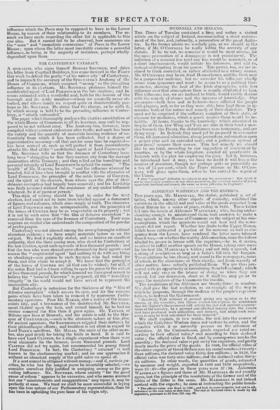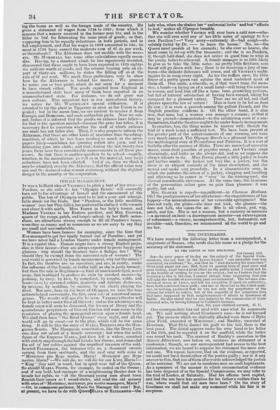ALDERMAN VCAITHMAN AND THE EXPORTS.
Two years ago, Mr. MARSHALL, the statist, published a set of tables, which, among other objects of curiosity, exhibited the variations in the official and real value of the goods exported from Great Britain thr a series of years,. ending in 1828. These tables felt into the hands of Alderman WiturnmAN ; rho, having understanding enough to misinterpret them, took occasion to niake long speech in the House of Commons on the subject of his misconceptions, which the members would not hear and• the newspapers did not report. Whether late drafts to the Upper House, which have subtracted a portion of the sarcasm as well as eloquence from the Lower, have rendered the latter more tolerant than it was,—or whether the worthy Alderman has, since the fidlure alluded to, grown in favour with the reporters,—be is, it, seems, resolved to infliet another speech on the House, taking once more for his text Mr. MARSHALL'S tables ' • and not only a speech, but a string of resolutions as long as a tailor's bill into the bargain. The resolutions he has already sent rotund to the newspapers, some of which, in the abundance of their charity, and from scarcityof other matter,have actually published them. We are thus presented with an opportunity of considering hem beforehand ; which will not only save us the labour of duing so when they are moved, but our discussion, short as it shall be, may go far to
spare the members of the Commons the trouble. .
The resolutions ofthe Alderman arc twenty-three in number. 'We shall give' the last verbatim, as an example of the way irt which he proposes, through the medium of the people's npeesen
tatives, to instruct the Government.
" Resolved, That without at present giving any opinion as to the causes, or the remedies, this house cannot but express • its confidence that his Majesty's Government will satisfy the just and anxious expectations of time country, by a prompt and effectual inquiry into the causes that have produced such difficulties and distress, and adopt such measures as may be best calculated for their removal."
We shall explain, in two words, the evil into the causes of
which the Collective Wisdom dares not venture to enter, and the remedies which it so earnestly presses on the attention of Ministers. At the Customhouse, goods exported are rated according to their official value,* and according to their declared value ; the official value is fixed, and by consequence marks the quantity ; the declared value is put on by the exporters, and pretty nearly marks the price of the goods. In 1808, lime official value of the entire exports of Great Britain was (in round numbers) twentythree millions, the declared value thirty-five millions ; in 1830, the official value was forty-nine millions, and the declared value thirtysix millions. In other words, the quantities of goods, estimated by measure and weight, exported in 1808 and 1830 respectively, were 23 : 49—the prices in these years were 37 :36. Alderman WAITHMAN'S figures and those of Mr. MARSHALL 40 not exactly agree, but the principle of the resolutions of the former and of the tables of the latter is the same. Mr. MARSHALL is not indeed content with the exports; he aims at instructing the public touch* The official value was fixed in 1496; and had, in some respects, but not in all, reference to the real value at that time. The real or declared value is made by the exporters, pursuant to 53 Geo. III. cap. 98. ing the home as well as the foreign trade of the country. He gives a statement of wages from 1798 to 1829; from which it appears that a weaver received in the_former year 159. and in the latter Is. 10d. for fabricating the same piece of goods ; so that, supposing him to be equally industrious in both periods, and in full employment, and that his wages in 1829 amounted to 10$., he must in 1798 have earned the moderate sum of 4/. 4s. per week, or thereabouts ! The Alderman does not meddle with the weavers. Mr. MARSHALL has some other calculations equally recondite. Having, by a standard which he has ingeniously invented, discovered that there ought to have been exported in 1828 eightysix millions worth of goods, and the returns bearing only an export of thirty-six millions, he states the falling off as at the rate of 97 per cent. We mark these particulars, only to show how far the Alderman is behind his master. We proceed to notice one or two points which do not seem for a moment to have struck either. The goods exported from England in a manufactured state have many of them been imported in an unmanufactured state. For instance, we do not grow our own cottons. This important fact in our agricultural history, we notice for Mr. WAITHMAN'S special edification. It is intended to try the plant in Tipperary as soon as the Union is repealed ; but in the mean time, we are content to receive it from Georgia and Demerara, and such outlandish parts. Now we submit, before it is inferred that the profits on calicoes have fallen— for that is the question mooted—because the price has fallen, it is necessary first to ascertain whether the stuff of which calicoes are made has not fallen also. Then, it is also proper to inform the Alderman, that there are other kinds of machines than thrashingmachines, of which he has been reading so much in the newspapers lately—machines for spinning cotton into yarn, and for fabricating yarn into cloth ; and that, during the last twenty-two years, there have been considerable improvements in all these processes. So that there is another question to be solved—namely, whether, in the manufacture as well as in the material, very large reductions have not been effected. And,if so, then we think it may be admitted, even by the Alderman, that the official value may rise and the declared value remain stationary, without the slightest danger to the country or the corporation.



























 Previous page
Previous page